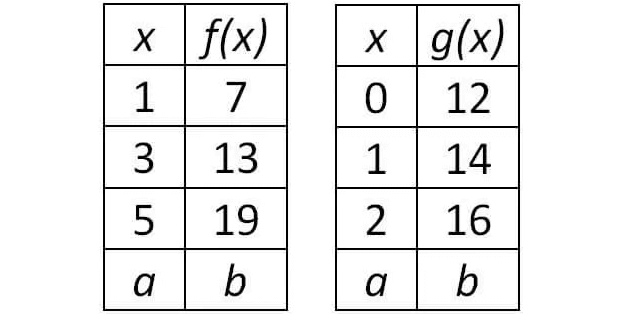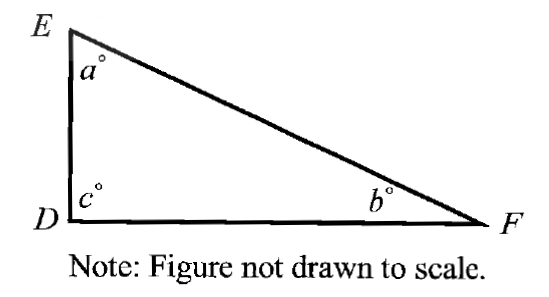HIGH SCHOOL MATH QUESTIONS WITH ANSWERS
Problem 1 :
Find the centroid of the triangle whose vertices are the points A (8 , 4) B (1 , 3) and C (3 , -1).
Solution :
Centroid of the triangle = (x1 +x2 + x3)/3, (y1+y2+y3)/3
= (8+1+3)/3, (4+3-1)/3
= 12/3, 6/3
= (4, 2)
So, the centroid of the triangle is (4, 2).
Problem 2 :
If the two lines are perpendicular with the slopes m1 and m2 then m1 ⋅ m2 =
Solution :
If two lines are perpendicular, then the product of their slopes will be equal to -1.
Problem 3 :
Find the coordinates of the orthocenter of the triangle whose vertices are A(3, 1), B(0, 4) and C(-3, 1).
Solution :
The point of intersection of two perpendicular drawn from any two vertices of the triangle is known as orthocenter.
Let us consider the perpendicular drawn from A is AD and perpendicular drawn from the vertex B is BE.
Slope of AC = [(y2 - y1)/(x2 - x1)]
A (3, 1) and C (-3, 1)
here x1 = 3, x2 = -3, y1 = 1 and y2 = 1
= (1 - 1) / (-3 - 3)
= 0 / (-6)
= 0
Slope of the altitude BE = -1/ slope of AC
= -1/0
Equation of the altitude BE :
(y - y1) = m (x -x1)
Here B (0, 4) and m = -1/0
(y - 4) = -1/0 (x - 0)
10 (y - 4) = -1(x)
x + 10y - 40 = 0 --------(1)
Slope of BC = (y2 - y1)(x2 - x1)]
B (0, 4) and C (-3, 1)
Here x1 = 0, x2 = -3, y1 = 4 and y2 = 1.
= (1 - 4) / (-3 - 0)
= (-3)/(-3)
= 1
Slope of the altitude AD = -1/ slope of AC
= -1/1
= -1
Equation of the altitude AD :
(y - y1) = m (x - x1)
Here A(3, 1) m = -1
(y - 1) = -1 (x - 3)
(y - 1) = -x + 3
x + y - 1 - 3 = 0
x + y - 4 = 0
x = -y + 4--------(2)
Substituting (2) into (1), we get
-y + 4 + 10y - 40 = 0
9y - 36 = 0
y = 36/9
y = 4
By applying y = 4 in (1), we get
x = -4 + 4
x = 0
Therefore the orthocenter is (0, 4).
Problem 4 :
Sum of the areas of two squares is 468 m2. If the difference of their perimeters is 24 m, determine the sides of the two squares.
Solution :
Let x and y be the side length of squares.
x2 + y2 = 468 ----(1)
4x - 4y = 24
x - y = 6
x = 6 + y ----(2)
(6+y)2 + y2 = 468
36+y2+12y+y2-468 = 0
2y2 + 12y - 432 = 0
y2 + 6y - 216 = 0
(y - 12)(y + 18) = 0
y = 12 and y = -18 (not admissible)
If y = 12, then x = 18
So, the side length of required squares are 12 and 18 respectively.
Problem 5 :
Two concentric circles are of radii 5 cm and 3 cm. Determine the length of the chord of the larger circle which touches the smaller circle.
Solution :
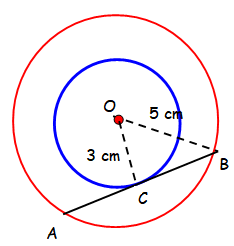
In triangle OCB,
OB2 = OC2 + BC2
52 = 32 + BC2
BC2 = 25 - 9
BC2 = 16
BC = 4
Problem 6 :
If sin A = 3/4, then the value of tan A
Solution :
Given,
sin A = 3/4 = Opposite side/Hypotenuse
Adjacent side2 = Hypotenuse2 - Opposite side2
Adjacent side2 = 42 - 32
Adjacent side2 = 16 - 9
Adjacent side = √7
tan A = Opposite side / Adjacent side
tan A = 3/√7
Problem 7 :
In triangle PQR right-angled at Q , PQ = 3 cm and PR = 6 cm. Determine ∠QPR
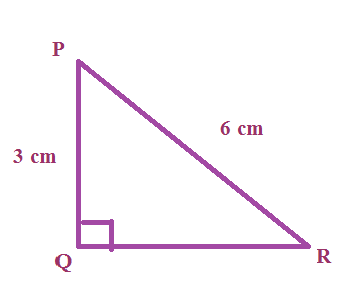
Solution :
tan p = Opposite side / Adjacent side
Using Pythagorean theorem,
PR2 = PQ2 + QR2
62 = 32 + QR2
36 - 9 = QR2
QR2 = 27
QR = 3√3
tan p = PQ/QR
tan p = 3/√3
Multiplying both numerator and denominator by √3, we get
tan p = √3
∠QPR = 60°
Problem 8 :
Simplify the following.
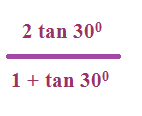
Solution :
= 2tan 30 / (1 + tan 30)
= 2 (1/√3) / (1 + 1/√3)
= 2/(√3 + 1)
= 2/(√3 + 1) ⋅ [(√3 - 1)/(√3 - 1)]
= 2(√3 - 1)/(√32 - 1)
= 2(√3 - 1)/2
= √3 - 1
Problem 9 :
Evaluate the following

Solution :
sin60 cos30 + sin30 cos60
= √3/2 (√3/2) + (1/2)(1/2)
= 3/4 + 1/4
= 4/4
= 1
Problem 10 :
Simplify (sec A + tan A) (1 - sin A) =
Solution :
(sec A + tan A) (1 - sin A)
= (1/cos A + sin A/cos A) (1-sinA)
= [(1+sinA)/cos A] ⋅(1-sinA)
= (1 - sin2A)/cos A
= cos2A/cos A
= cos A
Kindly mail your feedback to v4formath@gmail.com
We always appreciate your feedback.
©All rights reserved. onlinemath4all.com
Recent Articles
-
Digital SAT Math Problems and Solutions (Part - 141)
Apr 11, 25 10:38 AM
Digital SAT Math Problems and Solutions (Part - 141) -
Logarithm Problems and Solutions (Part - 3)
Apr 11, 25 08:19 AM
Logarithm Problems and Solutions (Part - 3) -
Digital SAT Math Problems and Solutions (Part - 140)
Apr 10, 25 08:18 AM
Digital SAT Math Problems and Solutions (Part - 140)
